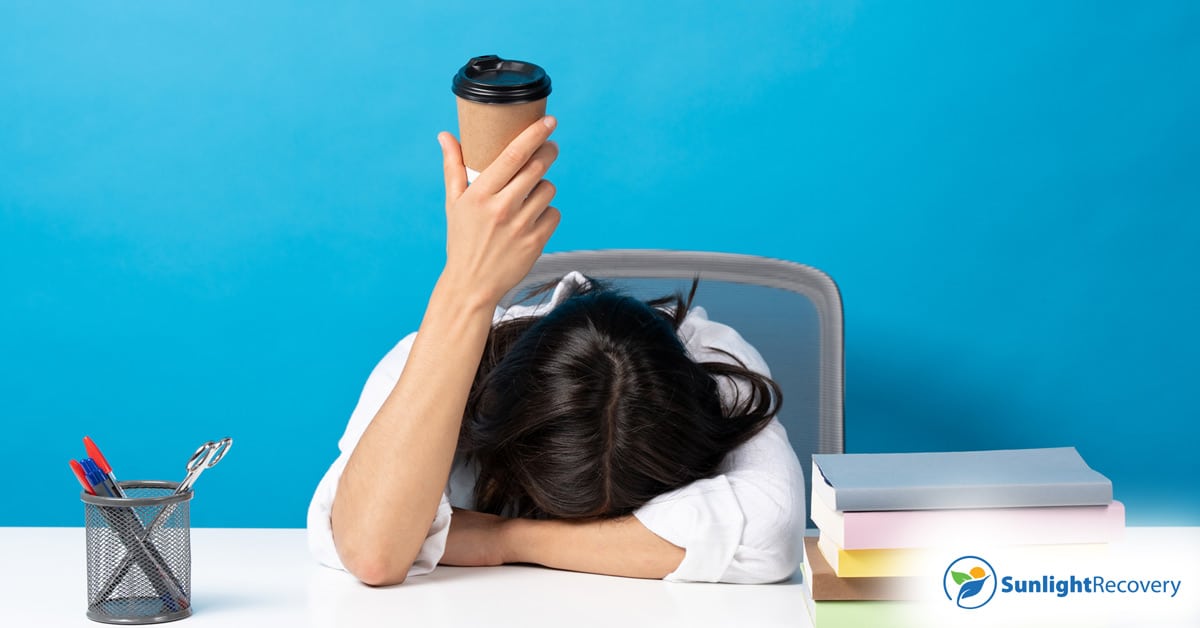Coffee is the most popular drink in the world — more than 2 billion cups are consumed every day across the globe. The drink is made by drying and roasting the beans of various coffee species, then grinding them up and straining hot water through them. Coffee contains the oils and alkaloids that were present in the beans, including an addictive chemical called caffeine. Caffeine addiction symptoms may be subtle, but some people may find them disturbing and seek help to overcome heavy use.
What Is Coffee Addiction?
Coffee addiction is marked by a progressively increasing consumption in the face of mounting negative consequences. This is a social definition, since it takes into consideration the personal and financial effects of substance use.
Because coffee is so widely consumed worldwide and the negative consequences of heavy use don’t commonly result in job loss, damaged families or other problems typical of other drugs, many people may become heavily dependent on caffeine without showing the typical signs of addiction.
Signs and Symptoms of Coffee Addiction
Low to moderate consumption of caffeine is generally considered safe, but high levels of consumption can be a sign of addiction. Most of the classically accepted signs of caffeine addiction align with the symptoms of caffeine dependence. These include:
- Dizziness
- Headaches
- Shakiness
- Nervousness or anxiety
- Racing heart or palpitations
- Elevated blood pressure
- Insomnia or otherwise disturbed sleep patterns
These are mainly the chemical effects of caffeine on the body, rather than the behavior-based signs of addiction. Because of the wide availability and broad social acceptance of coffee consumption, these are the issues most people refer to when talking about coffee addiction.
What Is the Difference Between Coffee Dependence and Addiction?
A distinction needs to be drawn between dependence and addiction as clinical concepts. Chemical dependence is a physiological process in which the body becomes used to the presence of a given chemical. Over time, it may become difficult to function normally without the presence of the substance. As the body develops a tolerance for the drug, progressively higher amounts are needed to feel normal and function as usual.
Addiction is different from dependence, though they often occur together. Addiction is marked by social consequences from habitual use. These may be in the form of lost money, missing work, degraded relationships with others, crime, self-harm and other negative behavioral outcomes. Thus, a person may use opioids to the point that they feel withdrawal symptoms and have a hard time functioning without the drug but have experienced no serious repercussions yet, such as a job loss or marriage breakup over the issue.
In this case, it would be appropriate to describe the person as being dependent on the drug or say they have a substance abuse disorder, but not necessarily that they’re addicted to the substance. The line into addiction is crossed when use continues in the face of consequences.
Because coffee is so widely consumed and socially acceptable, it’s rare for people to be technically addicted to its use. Caffeine is still a psychoactive drug, however, and chemical dependence is common. The negative consequences of caffeine dependence are thus nearly all related to the physical health effects of its consumption, which may be very mild to severe, depending on the person and the details of use.
How Coffee Addiction Affects the Body and Mind
Caffeine is a stimulant, so it accelerates metabolism and causes higher levels of alertness. Many people drink coffee to help them wake up in the morning or to stay awake later at night. These people are using the stimulant effects of the caffeine to accelerate the body’s normal waking-up routine or to stave off fatigue that would ordinarily make them sleepy at night. Caffeine also has secondary effects — it can cause an elevated heart rate, constriction of blood vessels, higher blood pressure and a general feeling of anxiety or agitation.
Withdrawal from caffeine can also cause physiological symptoms. A person who’s grown dependent on caffeine and suddenly has it withdrawn may become very irritable and moody. They may feel unwell in a vague, difficult-to-define way. Sometimes people get migraines with caffeine withdrawal, or they may become tired at odd or irregular times. Caffeine withdrawal can also cause insomnia, as the body’s accustomed cycle gets disrupted by the lack of the drug that used to be a part of sleep-wake cycle management.
How to Manage and Overcome Coffee Addiction
Overcoming coffee addiction may be as simple as stopping for some people. It’s not known how prevalent or serious caffeine dependence is, but many people have been able to simply quit drinking coffee cold turkey and suffer very little or not at all. Others may go through a withdrawal period typical of dependence, followed by a return to normal with few or no cravings.
People with a more serious caffeine addiction might need help from their doctor or a support group, though it’s not common to find a 12-step program devoted to managing coffee addiction symptoms. Still other people choose to continue consuming caffeine, but at lower doses or from different sources than coffee.
Alternatives to Coffee and Healthier Sources of Caffeine
Coffee isn’t the only thing people consume that has caffeine in it. Many popular food and beverage products have at least a small amount of caffeine, and for some people these represent a step in the right direction for reducing or tapering off their caffeine addiction symptoms. Common alternatives to getting caffeine from coffee include:
- Tea
- Soda
- Chocolate
- Guarana
- Energy drinks
- Nutritional supplements
Each of these sources has its own benefits and drawbacks, with most of them (except guarana) containing less caffeine per serving than a typical cup of coffee. For people trying to manage caffeine addiction, any one of these options (or more than one in combination) may be a viable alternative to multiple daily cups of coffee.



